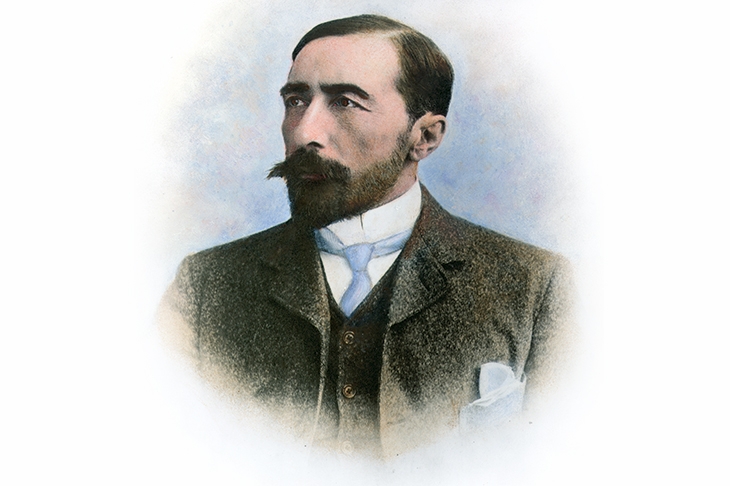In the 1890s, when British-owned ships carried 70 per cent of all seaborne trade, legislators worried about the proportion of foreigners who served in their crews; which could top 40 per cent. Their worry is not surprising, given the verdicts gathered from British consulates in port cities on the native seaman: ‘drunk, illiterate, weak, syphilitic, drunk, dishonest, drunk…’ In 1894, a parliamentary committee interrogated officers about manning and skills in the merchant marine.
One informant was a British-naturalised master ‘with 16 years’ experience’. The MPs, who didn’t presume to ask this expert witness specifically about foreign crews, recorded his name as ‘Mr J. Conrad Korzeniowski’. He had, as Maya Jasanoff puts it, ‘come a long way since landing in England in 1878’ as the penniless, orphaned son of Polish gentlefolk, his parents driven into penury, exile and early death by Tsarist persecution. A few months before he arrived in London, the 20-year-old Konrad Korzeniowski — alone, broke and ‘wrecked’ in Marseille — had attempted suicide. He never wrote about that.
The story of this ‘Polish nobleman cased in British tar’ (his words) still dazzles in all its briny glamour. If that stems in large part from the unsinkable merits of works such as Lord Jim and Under Western Eyes, The Secret Sharer and Heart of Darkness, this perennial allure also feeds on his ability to speak to readers everywhere who couldn’t tell a knot from a hitch or a jib from a boom.
A child stranded by his father’s patriotic conspiracies against Russian despotism, the immigrant seafarer who became Joseph Conrad spotted on the far horizon so many of the squalls and storms that still convulse us. From the crisis of old empires to the ascent of rising powers, from the global circulation of people, ideas and goods to the temptations of terrorism, the fiction he wrote in his third language (after Polish and French) bridges the age of sail and the age of the net. Jasanoff describes Conrad’s pen as ‘like a magic wand, conjuring the spirits of the future’. That wand, though, should surely be a telescope.
After the mighty dreadnought of Norman Sherry’s two-volume biography, and relatively nippier lives from John Stape and Zdzisław Najder, we hardly need another stately passage between Conrad’s birth in Berdychiv (now in Ukraine) in 1857 to his death in rural Kent — the refuge he loved ‘not as an inheritance, but as an acquisition’ — in 1924.
Jasanoff, a professor of history at Harvard and an enviably gifted writer, uses ‘the compass of a historian, the chart of a biographer, and the navigational sextant of a fiction reader’ as she locates Conrad’s journeys on the map of the first great epoch of globalisation before the first world war. With a focus on four masterworks (The Secret Agent, Lord Jim, Heart of Darkness, Nostromo), she demonstrates how the forces of revolutionary politics, world-spanning commerce, colonial plunder and imperial rivalry shaped both life and work without ever defining them.
Lovers of Conrad know that, however worldly and topical his writing (‘no one has known… the things you know’, Henry James told his friend), some inward essence — more metaphysical than geographical —will always slip away into a sea-mist. Cattily, E.M. Forster sneered that ‘the secret casket of his genius contains a vapour rather than a jewel’. Shrewdly, Jasanoff counters that, ‘for Conrad, the vapour was the jewel’.
So this is no reductive quest to match each plot twist with events in Poland, England, Borneo, Singapore, Colombia and Congo, although her historian’s eye can untie knots that might baffle the pure critic. The first-rate chapter on Nostromo — set in Latin America, for once a coast Conrad never sailed — explains much of that novel’s opaque, clotted texture. As Conrad wrote it, the intrigues that partnered the birth of the Panama Canal revealed that United States’s imperialism would soon trump Europe’s in the ferocious pursuit of ‘material interests’, ‘whether or not it had the word “empire” attached to it’. That book’s mid-stream rolls and pitches reflect its author’s veering responses to the sudden ‘coming of a new world order’.
If Captain Korzeniowski’s voyages stoked his tales, Jasanoff also shows that imagination plots its own course. Thus Conrad transplanted his nightmare of colonial anomie from Borneo to the Belgian Congo. In Heart of Darkness, Kurtz’s savagery predates many of the foulest atrocities in the slave state run by King Leopold: ‘the most nakedly abusive colonial regime in the world.’ Pushed by anti-imperialist friends such as R.G. Cunninghame Graham to join their campaigns, however, Conrad kept to his storyteller’s post. His father Apollo’s self-sacrificial tragedy had immunised him against ‘the flimsiness of ideals’. He stayed aloof, apart. Although happy ‘to sympathise with common mortals’ wherever their home, ‘in the streets under a fog, or in the forests beneath the dark line of dismal mangroves that fringe the vast solitude of the sea’, he withdrew from partisan passions. The only class he saluted was ‘the class of honest and able men’.
For all her verve and skill, Captain Jasanoff proves a fairly orthodox skipper. Her own well-told trips in Conrad’s wake — one on an austere container ship across the Indian Ocean; the other in a merry vessel up the Congo — add little to her studies of his prophetic ‘prescience’. She might have said more about the Conradian conflicts that have lately ravaged the landscapes of his fiction: the cocaine wars in and around Colombia, or the grotesque carnage in Central Africa fuelled by exploitation of the minerals that power our digital devices.
Another book could usefully occupy that berth. This one steers us securely and stylishly through those latitudes where Conrad witnessed the future scupper the past; and where (as Lord Jim has it) ‘the haggard utilitarian lies of our civilisation wither and die’.






Comments